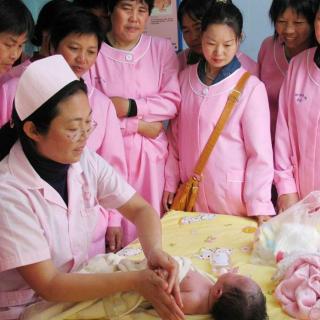
介绍:
Lincoln: Confinement nurses in China can now earn up to 23,000RMB a month. Wu You, what exactly is the story here?
WY: First of all, I need to explain a little bit about the Chinese tradition of yuezi, which is also known as “stegmonth”. It is a period of time for the new mum when they finished the childbirth. It is becoming the gold standard in postpartum recovery, inspired by a Chinese confinement custom known as “sitting the month”. New mothers must stay indoors to restore their energy, and yuesao, which you call the confinement nurse, they are serving the month, which means they will [teach] the new mums about breast-feeding techniques, and they can also be a chef, to cook those kinds of diets or special cuisine with high qualified nutrition.
Lincoln: This isn’t the same as a midwife, this isn’t someone who actually assists in the birth – this is a kind of aftercare thing, Michael?
Michael: Yeah, this is – I don’t think we really have this sort of thing in the west. We’re talking about somebody here whose job is specifically to look after the mother in the month or so after childbirth. As Wu You explained, in the traditional Chinese culture, it’s customary for new mothers to stay indoors for about a month or so.
WY: This kind of confinement practice was done strictly at home, under the care and help of grandmothers and aunts who banned bathing, fresh air and certain foods.
Lincoln: I think that’s something that exists across the world, historically, as well, women assisting each other. But it seems like this specific thing here, it seems a very specific skill for a good confinement nurse.
WY: Well, talking about skill, I think it is not easy to earn the money. There has been some levels or standards, because this is more like a modern industry or booming industry recently. The Chinese government has already published new standards for this industry. The administration says the regulation that takes effect in this year divides these nannies or confinement nurses into six levels based on their skills and experience. To attain the highest "gold medal" level, or gold medal confinement nurse, you have to satisfy all standard requirements and undergo various training sessions and assessments, and hold a junior high school or even college diploma, and they need to hold those kind of senior certificates for household service, and infant care, as well as intermediate [dietician] certificate. In the city of Shenzhen, which is an industrial hub in South China&`&s Guangdong province, it is more like in the coastal regions of China, or in the first tier cities.
Michael: A lot of people who live in Shenzhen are not actually from Shenzhen. You know, if you give birth in Shenzhen, you live there, maybe your aunt or your grandmother… [WY: They couldn’t go there.] Exactly – they might not be there, so I’m wondering, is that one reason why there has been such urgent demand for yuesao there? [WY: Exactly.] So is it the case that these yuesao are actually employed by a company who specializes in this sort of care, or do they work freelance?
WY: In the first place, this is more like freelance nurses, but after all, it is better regulated, and if you are hiring some kind of professional nurse, you won’t directly go to the freelance work, because you will directly find some agencies who will employ and double-check about the backgrounds of these nurses for you. And, talking about that in China, the administration issued this directive to access and rank these kinds of confinement nurse agencies, and also, these agencies are required to register their business, [and] hire at least three employees with high school diplomas.
Michael: So, you’ve got this situation where you’re lying down in the dark, in what might be a very small room. I don’t think that would be a very pleasant environment to be in.
WY: That demands a lot of efforts, but I need to say that this [was] the requirement in the old days in China. My understanding is because in the old days, the environment situation and condition are limited. People [were] not allowed to bathe because they didn’t have too much heat in the old days, and in ancient times, they [were] not allowed to wash their hair. They thought it might trigger some cold inside your body, and that is because they did not have this kind of hair dryer in the old days, and they cannot dry it, and then they might easy get cold. And we do not face this kind of situation any more, so I think those requirements, they are dying out a little bit.
大家还在听

